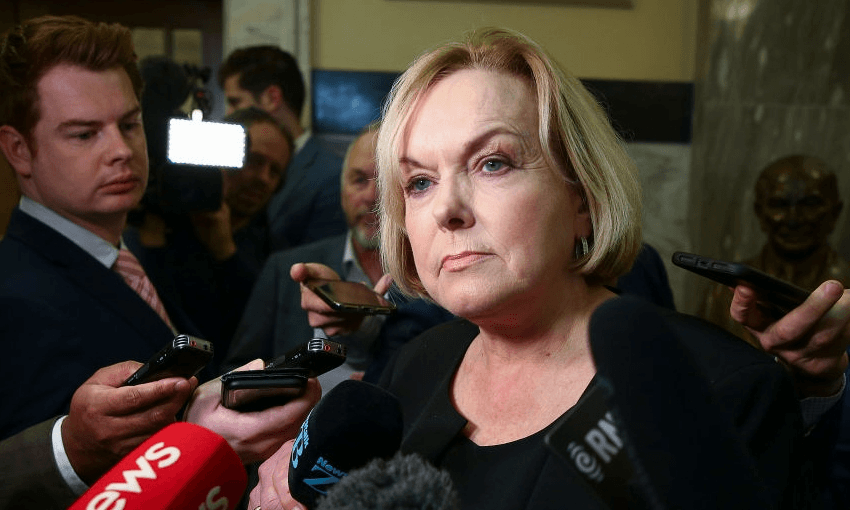The latest round of economic data won’t carry Judith Collins and the National Party into the promised land, and she’ll need to come up with something else to save her chances, writes political commentator Ben Thomas.
The government has delivered an economic miracle! How else to describe today’s labour market statistics for the June quarter showing that after a lengthy shutdown of the economy and a worldwide economic contraction, unemployment has fallen to 4%?
That’s not just less than half Treasury’s prediction for the unemployment rate, it’s 0.2% lower than the quarter before lockdown. Hallelujah!
Like most magic tricks, it pays not to look behind the curtain. Notably, Statistics New Zealand headlined its release not with the remarkable unemployment number but with “Covid-19 lockdown has widespread effects on the labour market”.
The statistics measure the whole three month period, not the situation right now. Unemployment measures “active jobseekers” without work and active job-seeking wasn’t exactly happening much during lockdown. Total hours worked were down 10%, a record drop, and the number of people wanting more work also rose by an unprecedented amount.
Read more: Why the hell has New Zealand’s unemployment rate just gone down?
No statistical artifice can change the fact that 37,000 more New Zealanders are relying on a Jobseeker benefit than in March, or that over 20,000 people are on the Covid Interim Relief Payment. (If all else was equal and these job losses were added to March’s figures, the unemployment rate would be closer to six-and-a-bit).
Most significantly no-one is sure exactly how many of the 470,000 jobs supported by the wage subsidy extension will still be there in October. Most economists continue to predict a sharp spike in job losses in the period after voting begins.
Still, the statistics at least suggest the wage subsidy has done its job for now. More workers are taking on reduced hours or pay cuts in order to spread the burden of the crisis rather than mass layoffs beyond what we’ve already seen, at least while it’s still in operation.
The 4% figure is therefore hardly the full picture and is no kind of guide to the world beyond September when the wage subsidy lapses. Nonetheless, it’s devastating politically for Labour’s rivals a month out from early voting.
National’s vote has been ricocheting between the mid 20s and high 30s over the past few months. The figures suggest a significant chunk of ordinarily reliable National voters (the party has exceeded 40% in the last four elections) have been won over by the prime minister’s response to the crisis and deterred by the party’s internal problems. But these voters can be lured back with good news for the opposition or bad news for the government – the members of this bloc are extremely soft in their support for Labour or National (few seem to have peeled off to minor parties, a key distinction from earlier campaigns with weak oppositions).
But every door is slamming shut for National. The predicted Treasury unemployment figure of 8.3% would’ve been a shattering psychological blow – the actual figure is a bulwark for the economy’s confidence (important, since consumer spending has been strong since lockdown ended), and less nobly a salve for the New Zealanders still in work who prefer to focus on “getting back to normal” than on the fallout in other communities, in particular Māori.
As unintuitive and near to meaningless as a drop in official unemployment is right now, the stat is the stat. It’s not the full picture, but it’s not wrong, by definition.
National’s campaign promised a “strong team”, “more jobs” and a “better economy”, pitching the enormous personal popularity of Ardern and the government’s successful public health response to Covid against its “17 empty seats in cabinet” and the forthcoming economic downturn. The “strong team” slogan has already become a running gag for a party tripping from scandal to meltdown to mass migrations.
While the fundamental criticism of the Ardern government’s competence remains true, National’s internal issues and departures have balanced the ledger somewhat. Labour this week said goodbye to Clare Curran and Iain Lees-Galloway while National has lost Amy Adams and Nikki Kaye.
Judith Collins, who terrorised the government on housing, has handed that key portfolio to Jacqui Dean – a short-lived minister under Bill English who mistakenly claimed in the media last week that National built ten times more state houses than it actually did, and once enquired about selling Te Papa’s Colossal Squid.
As far as “more jobs” and a “better economy”, that’s a harder argument to make when the outlook remains uncertain and the official statistics look downright rosy. If the doors are closing – and ruling out a community outbreak of Covid or serious border breach – National will have to force one open.
Ardern has sensibly opted to minimise the amount of new policies announced during the campaign, preferring to run on her government’s record in general and Covid in particular. This leaves space for National to excite the large swathe of (formerly solid National) voters whose allegiances seem to swing from headline to headline at the moment with, of all things, bold policy. Instead of relying on tropes like “Labour’s lack of delivery”, they need – to borrow from Ardern in 2017 – a vision.
The bad news on that front is that National’s policy programme under Amy Adams apparently finalised no new policies between its formation under Todd Muller and now. To avoid a week of disappointments turning into three years, National now needs to start delivering some miracles of their own.

